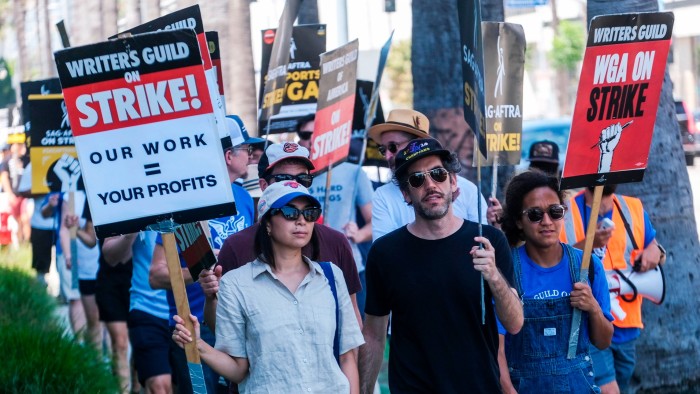Warner Bros Discovery saves $100mn as Hollywood strikes keep costs down

Roula Khalaf, Editor of the FT, selects her favourite stories in this weekly newsletter.
Warner Bros Discovery chief executive David Zaslav urged a resolution to a historic labour strike in Hollywood while revealing that the work stoppage had saved the company about $100mn in the most recent quarter.
“We’ve all got to fight to get this resolved,” Zaslav told analysts on a call on Thursday. “We’re in uncharted waters . . . we’re hopeful to get back in the negotiating room soon.”
Zaslav’s comments come as striking writers and the major Hollywood studios prepare to speak on Friday, ending a stalemate in negotiations between the two sides.
Hollywood actors last month joined screenwriters on the picket line, shutting down TV and film production in the first joint strike in more than six decades.
While Zaslav made an appeal to reach a deal, his company also disclosed that the historic shutdown in Hollywood has helped keep costs down in the short term.
Warner Bros Discovery saved about $100mn because of the strike during the three months to the end of June, helping the company narrow its losses and bolster its cash pile.

The company, which owns HBO, the Warner Bros movie studio and CNN, reported a quarterly loss of $1.2bn, down from $3.4bn a year ago. On a constant currency basis, revenue fell 4 per cent compared with a year ago, to $10.4bn.
As the Federal Reserve has raised interest rates over the past year, Wall Street has become sceptical of Hollywood’s growth-orientated streaming revolution and is focused on profits.
Most of the big entertainment companies are losing money from their streaming businesses, which require heavy investments.
Zaslav and his chief financial officer, Gunnar Wiedenfels, have made austerity a priority over the past year, a strategy that they say is paying off. Warner says its “Max” streaming unit will be profitable in the US this year.
Wiedenfels said he was “incredibly proud” of the second quarter financial results as a “cash focus is becoming evident across the company”. Warner is “focused on profitable growth as opposed to chasing [subscribers] at any cost”, Zaslav said.
The group reported free cash flow of $1.7bn for the June quarter, and predicts a similar number for the quarter to the end of September — helped by the strike and the success of Barbie, the Warner Bros film that has made more than $800mn at the box office since premiering a few weeks ago. In a nod to Barbie, Warner painted its earnings slide presentation in pink on Thursday.
Warner’s streaming division, which carries HBO hits such as Succession and The Last of Us, had an adjusted loss before interest, tax, depreciation and amortisation of $3mn in the three months ended June 30, narrower than the $518mn loss a year earlier.
Although the number of streaming subscribers decreased 1.8mn from the end of March to 95.8mn, division revenue jumped more than expected from a year earlier to $2.7bn.
Warner on Thursday announced a debt tender offer for up to $2.7bn. The company’s debt stood at $47.8bn at the end of June.
Comments